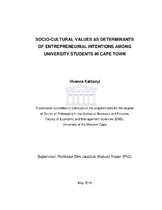| dc.description.abstract | In many parts of the world and in South Africa in particular, there is a growing body of literature supporting the opinion that intentions play a crucial role in the decision to become an entrepreneur. Models of entrepreneurial intentions around the world have been developed, but in South Africa studies in this regard are still inconclusive, especially among the youth. This research study primarily aimed at investigating how social, cultural and socio-economic factors of entrepreneurship students in the universities of the Western Cape Province shape their entrepreneurial intentions. Entrepreneurial intentions, social factors, cultural values, as well as socioeconomic factors, were reviewed in the literature and are presented in this dissertation. The study adopted a mixed-methods approach through the amalgamation of both qualitative and quantitative research methodologies. A survey questionnaire was administered to the respondents —
entrepreneurship students from the University of Cape Town (UCT), the
University of Stellenbosch (US), the University of the Western Cape (UWC) and the Cape Peninsula University of Technology (CPUT). Data collected was coded by means of the Statistical Program for Social Sciences (SPSS), version 22. Six variables out of nine of the instrument had a coefficient Alpha (Cronbach) of more than 0.7, while the remaining three had a coefficient Alpha of between 0.5 and 0.7; this extended its reliability. The study discovered that most of the items of the instrument had a positive relationship with their variables, leading to the variables being considered as having an influence on entrepreneurial intentions. In fact, the study found that social factors, as well as cultural values and socio-economic values, impact on self-efficacy and entrepreneurial intentions. The result of the research is that the study suggests a model of entrepreneurial intentions among university students, and in the final chapter concludes with recommendations
and suggestions for future research. | en_US |

